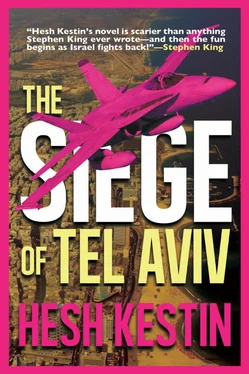“Neutrality Act of 1935, Mr. President.”
“Remind me again how that goes.”
“In essence, American citizens on warring ships travel at their own risk.”
“Sir, these are not warring ships.”
“Neutrality Act of 1937,” St. George says. “US ships are forbidden from transporting passengers or articles to belligerents in a foreign war.”
“You just said these are not US ships,” Spier tells him—and the president.
Felix St. George loves to play poker when he has all the cards. “Good one! That specific loophole was closed by the Neutrality Act of 1939. American citizens and ships are barred from entering a war-zone.”
The president grunts as the corpsman leans hard on a nerve. “Flo, I think that’s pretty clear.”
“Mr. President, the American people—”
“Flo, the American people don’t want to keep on spending ten bucks a gallon for regular,” the president says. “Case closed.”
IN NUMBER FOUR HANGAR at US Marine Aviation Forward Attack Squadron Wildcat, the installation’s top non-commissioned officer, a sergeant major who in civilian life may have a proper name but here is known only as Sergeant Major, laconically supervises the base’s cook, known only as Cooky, and five fascinated messmen. A Marine hoses fuel into a fifty-gallon drum heating perilously over a propane stove.
“Enough juice,” Sergeant Major announces. “Now johnwayne them cans. All of them.” He refers to the flat, hinged can openers used by the military since World War II—until the nineteen eighties the P-38, since then the larger P-51—though no one is certain why the actor, who never saw combat other than on celluloid, was so honored. By extension, to johnwayne something is to open it.
“Sergeant Major,” the cook cautions, “we ain’t gonna have no tomato sauce or ketchup for two months. When the colonel gets back, she ain’t gonna like it.”
“Boo fuckin’ hoo. Until she comes back, the responsibility’s mine.”
Having filed notice of this potential problem, for which Cooky will have to pay when base personnel find themselves facing weeks of ketchup-less French fries, to say nothing of unadorned cheeseburgers, Cooky affirms his commitment to the command structure. “Aye, Sergeant Major!” Nobody, including the pilots who outrank him, fucks with Sergeant Major. Cooky shouts to the messmen, “Sergeant Major has spoken!”
After they pour gallon cans of tomato puree and ketchup into the oil drum, the master gunnery sergeant demonstrates the kind of expertise that only a grizzled twenty-year veteran Marine can boast. “Now secret ingredient numero uno.”
The messmen dump in powdered milk and stir. The concoction turns an admirable Pepto-Bismol pink.
Sergeant Major’s craggy face develops the rictus that passes, among Marine non-commissioned officers, for a smile. “Secret ingredient numero dos. Three volunteers. You, you, and you. One step forward, unholster them guns the good Lord give you, and fire at will.”
“In the soup?” Cooky asks. He is not questioning Sergeant Major’s authority, only his recipe. Even for Marine Aviation, this may be over the top.
Sergeant Major allows the rictus again to flash over his face. “Cooky, don’t call it soup. It’s paint, is all.”
The three volunteers piss into the drum.
WITH ONE EYE ON the gas gauge and one eye on the road, Alex turns back in the direction from which he came, in doing so nearly hitting the same two Bedouin he passed only moments before. After he just about grazes them, he sees in his rearview mirror that they have stopped to bow. He thinks: if I really were an Egyptian officer, I would check them out.
At the turnoff he parks in front of a neat whitewashed stucco church, marked modestly with a cross over the door but boasting no steeple. Since the eighth century, when Islam swept across the Middle East, Christian Arabs have been careful to moderate public displays of their faith. Even under Israeli rule, when Christians no longer feared government persecution, it remained wise not to affront their Muslim neighbors. But however modest Arab churches appear from without, inside they are decorated like jewelry bazaars.
Alex steps into the smaller building to the right of the church.
It is a barber shop. Immediately, two customers waiting their turn beneath the cross that dominates the room quietly leave. An Egyptian officer is not to be made to wait. The territory once known as Israel, where every bastard felt himself a king, has returned to being part of the Middle East, where every king, no matter how small, lords over his bastards without limitation.
The barber is forty, bald, fat, and in need of a shave, practically the official uniform of the Middle East chapter of the barbers’ guild. He nods to Alex as he holds a mirror to the gleaming, freshly shaved head of the customer in the single chair, who takes one look at Alex’s uniform and gathers his things.
“Abu-Yunis welcomes you, excellency,” the barber says in Arabic. “As it happens, you are next. Shave?”
“I was informed there might be petrol,” Alex says in Arabic.
“But surely first a shave?”
Alex feels his face. An Egyptian staff officer would always be clean-shaven. “Why not?”
“Hair as well, Excellency? You will be satisfied. Abu-Yunis works clean.”
Alex glances in the large mirror opposite to see the last customer’s bald pate move out the door. “Just the shave, thank you.” He takes a seat in the chair and immediately his face is covered with a hot towel. The sensation is at the same time one of luxury and paranoia—it feels so very good, but he cannot see.
“You drive west, excellency?”
“Ow mff jmmd o?”
The towel is removed.
“How did you know?”
Abu-Yunis spreads lather over Alex’s face with a brush so soft it might be a caress. “Excellency, here Abu-Yunis is barber, gas station, grocer, also building supplies. Therefore he must know everything.”
“I’m glad someone does.”
The barber begins shaving Alex’s cheek. His touch is light. The straight razor seems barely to graze his face.
“His excellency passed several Syrian bases, then. There is gas available there, or did the colonel not know? Excellency is a colonel?”
“I must have missed the bases. Colonel, yes.”
“Colonel, I am Abu-Yunis. Please hold still—my blade is sharp. You travel to Tel Aviv?”
“To the front. That is correct.”
Abu-Yunis pauses, the razor poised at Alex’s throat. “To Tel Aviv?”
“For the final attack, yes.”
Suddenly the barber is no longer speaking Arabic. “Why would an Egyptian officer in need of gas pass such military bases?”
“Is that Hebrew?” Alex returns in Arabic. “Regretfully, I do not speak it.”
Nevertheless Abu-Yunis continues the same way. “If the colonel is an Egyptian, then Abu-Yunis is just a barber.” He moves the razor slowly over Alex’s throat.
Alex has no choice. “You’re not just a barber?” he replies in Hebrew.
“Until one month ago, Abu-Yunis was a proud citizen of Israel. He voted. He had freedom of speech and movement. His children studied in good schools. He could not be arrested without just cause. Neither as an Arab nor a Christian did harm come to him.”
“And?”
The barber shrugs. “From time to time Abu-Yunis assisted his government.” He has finished the shave. With the still-warm towel, he carefully wipes the rest of the lather from Alex’s face.
“What do I owe you, Abu-Yunis? Aside from my life?”
“To get to Tel-Aviv as quickly as possible. To tell your people that when the time comes the Christian citizens of this area will cut the invaders’ throats as I have not cut yours.” He laughs. “Also, next time to send a spy whose Egyptian accent is more… practiced.”
Читать дальше












